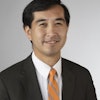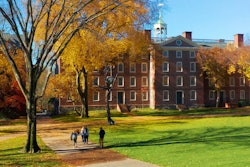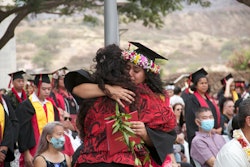In an auditorium brimming with a sea of the country’s brightest young scholars attending prestigious universities like Georgetown and the University of California, Berkeley, Tiffany Dang recalls looking around, and asking herself, “What am I doing here? Am I really at their level?”
Dang, a recent graduate from City College of San Francisco, was the only student from a community college to win this year’s National Security Education Program Award, which she accepted during a ceremony in Washington, D.C., this June. It was an honor that also included scholarship money worth $20,000 to study one year at Nanjing University and Beijing University in China.
The application process was complex and rigorous, but Dang’s NSEP advisor, Sue Light, former Dean of International Relations at City College of San Francisco, saw her true potential.
“She’s a very bright girl and focused. If she has an idea that she is going to do something, she will,” Light says, also noting that this experience to study abroad is an enormous benefit to community college students like Dang. “I know we have very brilliant students here, and we don’t have a lot to offer them, except helping them get into good universities. Something like this really brings them out of the woodwork.”
Dang, 22, who is now enrolled at UC Berkeley’s International Relations program as a junior, will begin her studies in China this spring.
Although Dang was born and raised in San Francisco, her parents are Chinese, and they lived in Cambodia until they immigrated to the United States before she was born. As a child of immigrants, Dang has seen her family struggle to make ends meet. Her parents took on menial jobs as dishwashers, babysitters and store clerks — any job that required minimal English language skills.
“Even though they tried to go to the community college and learn English, they couldn’t stay in class because of the work load at home and trying to make a living at the same time,” Dang says. “They understand some English, but hope that their kids can assimilate, so it could help out in the future.”
Winning the NSEP award and heading to China in the Spring will give Dang the cultural and business experiences, and language skills (she hopes to be fluent in Mandarin when she returns to the United States) to pursue her goal to work towards policy changes for Asian Americans.
“I think the Asian American population is very much underrepresented in the United States,” Dang says. “Especially in politics.”
She points out that since China has been in the forefront of global economics, people are just starting to notice it and other Asian countries.
“I guess we’ve used that momentum to get attention for Asian Americans, (because there is) the whole ‘model minority’ myth. But, there are actually a lot of people that need help,” she says.
Dang spent many of her high school years working two jobs and going to school. She worked at a restaurant during the weekend, and during the school week was a mentor at an after school program, where 95 percent of the children were first-generation Chinese Americans.
“I taught the (children) community service skills, community building and public speaking, which was to build their confidence — making them more well-rounded as they grow up, because they are not exposed to a lot of things at home,” Dang says.
But growing up, Dang remembers her father educating her about world politics as they watched the news together.
“He talked about politics and international relations between the United States and Asian countries,” she says. “I didn’t know what he was talking about, but I listened. That’s part of the reason I got interested in international law. I want to give back to my community.”
There are currently 0 comments on this story.
Click here to post a comment
© Copyright 2005 by DiverseEducation.com





















